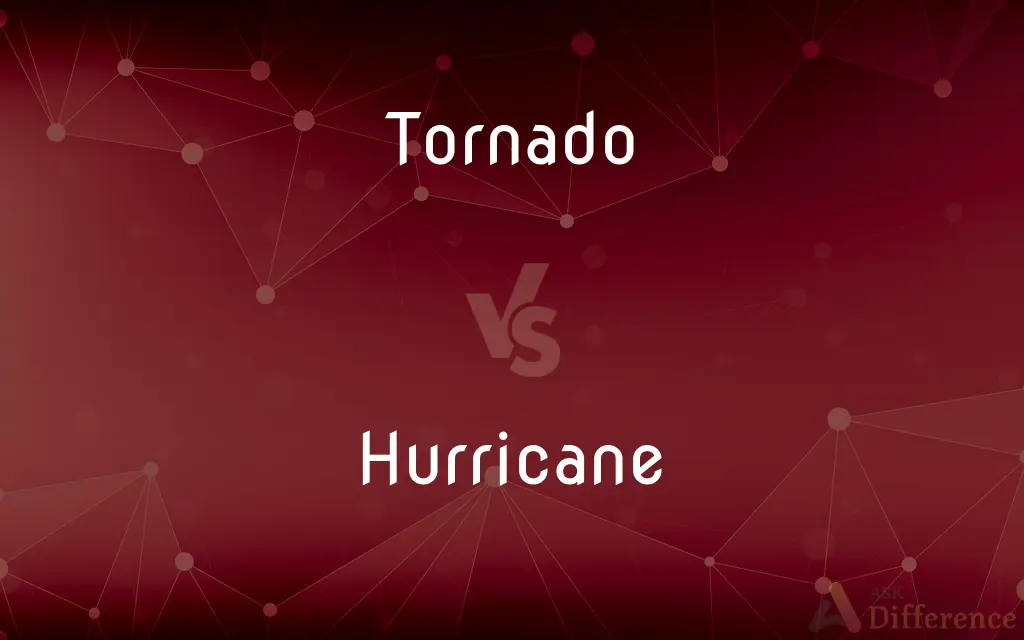Tornado vs. Hurricane — What's the Difference?
By Urooj Arif & Fiza Rafique — Updated on March 25, 2024
A tornado is a rapidly rotating column of air in contact with the ground, known for its destructive path over a small area, while a hurricane is a large tropical storm system with high winds circulating around a central eye, affecting extensive regions.

Difference Between Tornado and Hurricane
Table of Contents
ADVERTISEMENT
Key Differences
Tornadoes are intense columns of rapidly rotating air connected to the ground and often associated with severe thunderstorms. They typically cover a small area but can cause significant damage along their path. Hurricanes, on the other hand, are massive storm systems originating over warm ocean waters, characterized by high winds, heavy rain, and a distinct eye, impacting large areas and multiple regions.
The formation of a tornado is usually linked to severe thunderstorms and specific atmospheric conditions, including wind shear and instability. These conditions can lead to the development of supercell thunderstorms, from which tornadoes can emerge. Whereas hurricanes develop over warm ocean waters, drawing energy from the heat of the sea, and require a combination of atmospheric conditions to grow and sustain their power.
Tornadoes are known for their sudden onset and relatively short duration, often lasting from a few seconds to over an hour. The unpredictability and rapid formation make them particularly dangerous. In contrast, hurricanes develop over days or even weeks, allowing for more advanced warnings and preparations due to their predictable paths and the monitoring capabilities of meteorological agencies.
Tornadoes are rated on the Enhanced Fujita (EF) scale, which ranges from EF0 to EF5 based on damage assessments. Hurricanes, however, are classified according to the Saffir-Simpson Hurricane Wind Scale, which categorizes them from Category 1 to Category 5 based on sustained wind speeds.
The impact of tornadoes is usually localized but can be extremely destructive, demolishing buildings, uprooting trees, and hurling debris with incredible force. Hurricanes affect broader areas, bringing widespread flooding, storm surges, and extensive wind damage over vast regions, often leading to significant economic and environmental consequences.
ADVERTISEMENT
Comparison Chart
Size and Scope
Small, localized
Large, affecting wide regions
Formation
Severe thunderstorms, specific conditions
Warm ocean waters, atmospheric conditions
Duration
Seconds to over an hour
Days to weeks
Warning Time
Short, sometimes minutes
Longer, days in advance
Intensity Scale
Enhanced Fujita (EF) scale
Saffir-Simpson Hurricane Wind Scale
Main Hazards
Wind damage, debris
Wind damage, flooding, storm surge
Geographic Occurrence
Primarily land, especially in Tornado Alley in the US
Tropical and subtropical ocean regions
Compare with Definitions
Tornado
Tornadoes are rated EF0 to EF5, indicating their destructiveness.
An EF3 tornado can tear roofs off houses.
Hurricane
Can last for days or weeks, with paths that are monitored and predicted.
Residents had days to prepare for the hurricane's landfall.
Tornado
Often little to no warning before a tornado strikes.
The tornado appeared suddenly, leaving little time for the residents to seek shelter.
Hurricane
Affects large areas with high winds, heavy rain, and flooding.
The hurricane led to massive flooding and power outages.
Tornado
Known for causing severe damage over small areas.
The tornado demolished a swath of the town in minutes.
Hurricane
In addition to winds, it can cause storm surges and widespread flooding.
The hurricane's storm surge inundated coastal communities.
Tornado
A tornado is a narrow, spinning column of air extending from a thunderstorm to the ground.
The tornado uprooted trees and destroyed homes in its path.
Hurricane
Hurricanes are categorized from Category 1 to 5 based on wind speed.
A Category 4 hurricane can cause catastrophic damage.
Tornado
Typically lasts for a short duration but with intense impact.
The tornado dissipated after devastating the countryside.
Hurricane
A hurricane is a massive storm system with high winds circulating around a central eye.
The hurricane caused widespread destruction across several islands.
Tornado
A tornado is a violently rotating column of air that is in contact with both the surface of the Earth and a cumulonimbus cloud or, in rare cases, the base of a cumulus cloud. The windstorm is often referred to as a twister, whirlwind or cyclone, although the word cyclone is used in meteorology to name a weather system with a low-pressure area in the center around which, from an observer looking down toward the surface of the earth, winds blow counterclockwise in the Northern Hemisphere and clockwise in the Southern.
Hurricane
A severe tropical cyclone having winds greater than 64 knots (74 miles per hour; 119 kilometers per hour), originating in the equatorial regions of the Atlantic Ocean or Caribbean Sea or eastern regions of the Pacific Ocean, traveling north, northwest, or northeast from its point of origin, and usually involving heavy rains.
Tornado
A violently rotating column of air extending from a cumulonimbus cloud to the ground, ranging in width from a few meters to more than a kilometer, with destructive winds up to 510 kilometers (316 miles) per hour or higher. Tornadoes are typically associated with a funnel cloud pendant from a storm's wall cloud, often extending to the bottom of the tornado.
Hurricane
A wind with a speed greater than 64 knots (74 miles per hour; 119 kilometers per hour per hour), according to the Beaufort scale.
Tornado
A violent thunderstorm in western Africa or nearby Atlantic waters.
Hurricane
Something resembling a hurricane in force or speed.
Tornado
A whirlwind or hurricane.
Hurricane
A severe tropical cyclone in the North Atlantic Ocean, Caribbean Sea, Gulf of Mexico, or in the eastern North Pacific off the west coast of Mexico, with winds of 119 km/h (74 miles per hour) or greater accompanied by rain, lightning, and thunder that sometimes moves into temperate latitudes.
Tornado
(meteorology) A violent windstorm characterized by a mobile, twisting, funnel-shaped cloud.
A tornado is a rotating column of air.
Hurricane
(meteorology) A wind scale for quite strong wind, stronger than a storm
Tornado
A violent whirling wind; specifically (Meteorol.), a tempest distinguished by a rapid whirling and slow progressive motion, usually accompaned with severe thunder, lightning, and torrents of rain, and commonly of short duration and small breadth; a small cyclone.
Hurricane
"full—triple-full—full" – an acrobatic maneuver consisting of three flips and five twists, with one twist on the first flip, three twists on the second flip, one twist on the third flip
Tornado
A localized and violently destructive windstorm occurring over land characterized by a funnel-shaped cloud extending toward the ground
Hurricane
A violent storm, characterized by extreme fury and sudden changes of the wind, and generally accompanied by rain, thunder, and lightning; - especially prevalent in the East and West Indies. Also used figuratively.
Like the smoke in a hurricane whirl'd.
Each guilty thought to me isA dreadful hurricane.
Tornado
A purified and potent form of cocaine that is smoked rather than snorted
Hurricane
A severe tropical cyclone usually with heavy rains and winds moving a 73-136 knots (12 on the Beaufort scale)
Common Curiosities
Can tornadoes form during a hurricane?
Yes, tornadoes can form within the bands of a hurricane, especially when it makes landfall.
What is the average duration of a tornado compared to a hurricane?
Tornadoes last from seconds to over an hour, while hurricanes can last for days to weeks.
What is the main difference between a tornado and a hurricane?
Tornadoes are rapidly rotating columns of air causing localized damage, while hurricanes are large storm systems with widespread impacts.
Where do tornadoes and hurricanes typically occur?
Tornadoes are common in land areas, particularly in the US's Tornado Alley, while hurricanes form over warm ocean waters.
How are the intensities of tornadoes and hurricanes measured?
Tornado intensity is measured on the EF scale, and hurricane intensity on the Saffir-Simpson scale.
Do tornadoes and hurricanes only occur in specific seasons?
Tornadoes can occur year-round but are most common in spring and early summer in the US, while hurricanes typically occur from June to November.
What kind of damage do hurricanes cause?
Hurricanes can cause wind damage, flooding, and storm surges.
Which is more predictable, a tornado or a hurricane?
Hurricanes are more predictable due to their longer development time and path predictability.
What are the main hazards of tornadoes?
The main hazards include wind damage and flying debris.
Is there any technology to control tornadoes or hurricanes?
There is no technology to control them, but early warning systems can mitigate their impacts.
How does climate change affect tornadoes and hurricanes?
Climate change is believed to influence the intensity and frequency of these events, potentially leading to more severe weather occurrences.
How do meteorologists detect and track tornadoes and hurricanes?
Tornadoes are detected using radar and storm spotters, while hurricanes are tracked through satellites and weather aircraft.
What are the preventive measures for tornadoes and hurricanes?
For tornadoes, seeking shelter in a basement or interior room; for hurricanes, evacuation and securing property against wind and water.
What should individuals do if they receive a tornado or hurricane warning?
They should follow safety instructions, which for tornadoes mean seeking shelter immediately, and for hurricanes, it may involve evacuation or securing one's home.
Share Your Discovery

Previous Comparison
Behaviour vs. Personality
Next Comparison
Sikhism vs. ChristianityAuthor Spotlight
Written by
Urooj ArifUrooj is a skilled content writer at Ask Difference, known for her exceptional ability to simplify complex topics into engaging and informative content. With a passion for research and a flair for clear, concise writing, she consistently delivers articles that resonate with our diverse audience.
Co-written by
Fiza RafiqueFiza Rafique is a skilled content writer at AskDifference.com, where she meticulously refines and enhances written pieces. Drawing from her vast editorial expertise, Fiza ensures clarity, accuracy, and precision in every article. Passionate about language, she continually seeks to elevate the quality of content for readers worldwide.
















































